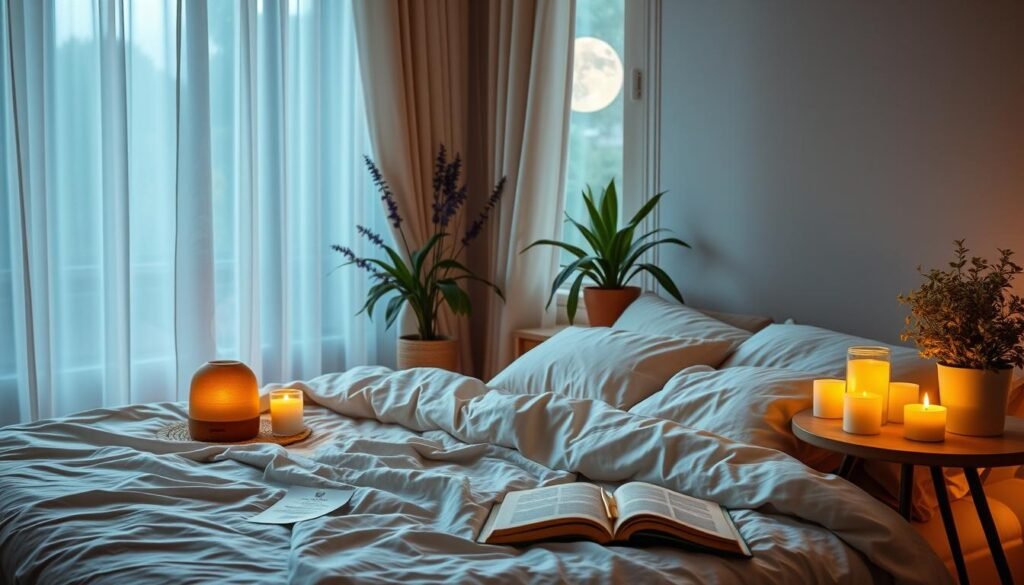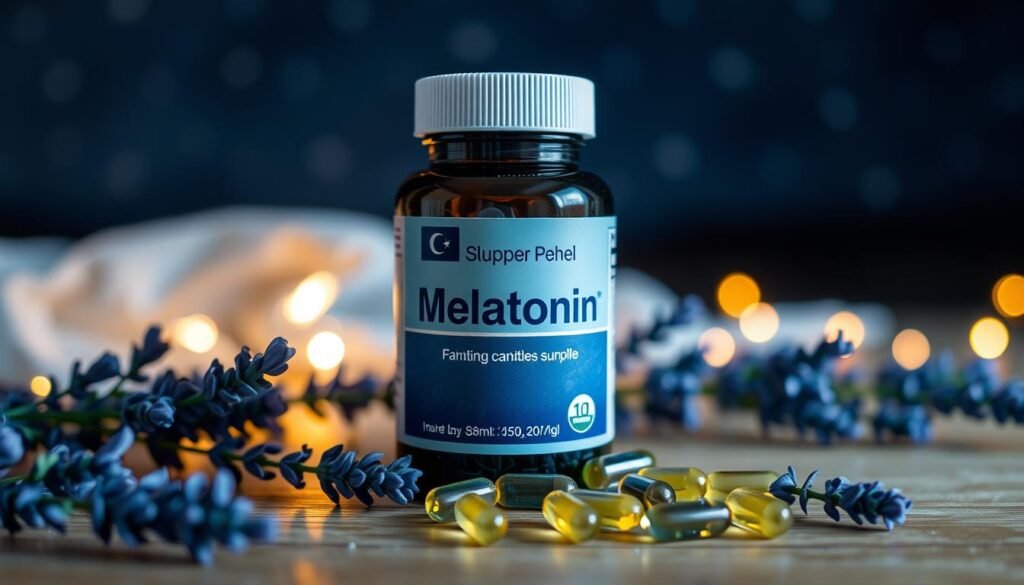About 20% of adults have insomnia sometimes. Prescription sleep aids like Eszopiclone (Lunesta) and Zolpidem tartrate (Ambien) are common. Yet, they might cause side effects and dependency over time. Luckily, natural sleep solutions exist. They offer a safe way to tackle insomnia. Options include herbal remedies such as valerian root and calming activities like meditation. These methods can boost sleep quality and promote a healthier lifestyle overall.
Natural insomnia treatments are gaining traction. They provide easy and working ways to get better sleep. Mixing good sleep habits with things like melatonin supplements or breath exercises can make success more likely. Through this journey into natural sleep remedies, readers can discover various options that fit their sleep needs.
Key Takeaways
- 20% of adults experience occasional insomnia symptoms.
- Medicinal sleeping pills may cause side effects and dependence.
- Natural sleep aids include herbal remedies and relaxation techniques.
- Incorporating good sleep hygiene is essential for effective treatment.
- Melatonin supplements may improve sleep quality and latency.
- Regular exercise can significantly enhance sleep in various populations.
Understanding Insomnia and Its Importance
Insomnia is a big challenge for many people around the world. It includes trouble falling asleep, staying asleep, or waking up too early. About two-thirds of people will have insomnia symptoms at some point. Around 10% to 15% suffer from chronic insomnia, happening more than three times a week for over three months.
Definition of Insomnia
Insomnia is a sleep disorder that makes it hard to get restful sleep. It can be caused by many things like age, gender, and health conditions such as diabetes or chronic pain. Mood disorders, family history of sleep troubles, and anxiety can also make it worse. Knowing what insomnia is helps people find the right help.
The Impact of Poor Sleep on Health
Good sleep is very important for health. Not getting enough sleep can cause serious health problems. This includes heart disease, obesity, and diabetes. The link between bad sleep and health issues shows why managing insomnia is crucial.
Poor sleep affects the mind too, impacting memory, creativity, and learning. This shows the broad effects of insomnia on well-being.
| Health Effects of Insomnia | Potential Risk Factors |
|---|---|
| Heart disease | Older age |
| Obesity | Lower socioeconomic status |
| Diabetes | Chronic pain |
| Poor cognitive functions | Depression and anxiety |
| Increased risk of accidents | Family history of insomnia |
Common Causes of Insomnia
Understanding what leads to insomnia is key to treating it. Many times, psychological issues are to blame. Stress and anxiety can make your mind race, making it hard to sleep. These feelings can stop you from getting the rest you need, especially if they don’t go away.
Stress and Anxiety
Stress and anxiety affect a lot of people at night. Worrying about work, relationships, or money can keep you awake. This can lead to insomnia. To feel better, some change their lives or get professional help. This can make sleep easier to come by.
Medical Conditions and Medications
Some health issues make it tough to sleep well. Chronic pain or problems breathing can make insomnia worse. Also, some drugs, like antidepressants, can disrupt sleep. Along with prescription medications, some treatments may involve antiseizure drugs and over-the-counter options. Knowing these details can help in dealing with insomnia. Learning about insomnia’s causes and effects is important for finding solutions.
Overview of Natural Insomnia Treatments
Natural insomnia treatments follow a holistic path. They aim to improve sleep by focusing on nature and lifestyle changes. They generally offer fewer side effects and a more sustainable sleep improvement way. Studies have shown that they can greatly improve sleep hygiene and well-being.
Benefits of Natural Remedies
Natural remedies for insomnia come with many advantages. They work by helping the body heal and stabilize sleep naturally. Here are some main benefits:
- Fewer Side Effects: Natural treatments tend to have fewer side effects compared to medications.
- Enhanced Sleep Hygiene: They promote good sleep habits, like keeping a regular sleep schedule.
- Stress Management: Relaxation techniques in natural treatments help reduce stress and improve sleep.
Complementary Approaches
Adding complementary therapies can boost the effect of natural remedies. Combining exercise, mindfulness, and dietary changes can make a big difference. Here are some effective methods:
- Mindfulness Techniques: Meditation and repeating mantras are known to ease insomnia and increase relaxation.
- Physical Activity: Regular exercise helps lessen insomnia symptoms and improves mood.
- Magnesium Supplementation: Magnesium has been found to help with sleep issues.
- Aromatherapy: Using lavender oil has helped people sleep better, especially those dealing with stress.
Together, natural treatments and complementary methods offer a strong plan for better sleep.

Herbal Remedies for Sleep
Herbal remedies for sleep are now more popular. They offer a natural way to improve sleep quality. This is without the side effects that often come with pharmaceuticals. Valerian root, lavender, and passionflower are especially notable for their helpful qualities.
Valerian Root: An Overview
Valerian root has been used for a long time to aid sleep. Studies show it may help you fall asleep faster. A dose of 400-900 milligrams, taken two hours before bed, is often suggested.
Research supports that valerian root can enhance how quickly you fall asleep. It also improves overall sleep quality. Therefore, it’s a favorite among herbal sleep aides.
Lavender and its Calming Effects
Lavender is known for its pleasant scent. Beyond just smelling nice, lavender can help improve sleep and ease anxiety. Its soothing effects also help create a peaceful bedtime environment.
This makes it an important part of any nighttime routine.
Passionflower: A Natural Alternative
Passionflower is gaining recognition for its calming effects. Some research suggests it can help with sleep problems. Though more studies are needed, passionflower offers a soft, natural remedy for sleep issues.
Using these herbal solutions as part of your nightly routine can help you sleep better. For more information on natural sleep aids, check out expert advice here. Learn about the best bedtime teas at this link.

Melatonin Supplements
Melatonin is key for our sleep-wake cycle. It is made by the pineal gland when it’s dark to make us sleepy. Knowing how melatonin works helps those who have trouble sleeping. This includes people with insomnia or those who travel a lot.
How Melatonin Works
Melatonin might help people with insomnia fall asleep a bit faster. It can also make jet lag less trouble by keeping you alert and cutting down on sleepiness during the day. Elderly people might find it very helpful since they might not make enough melatonin. This can make their sleep better.
Optimal Dosages and Safety Considerations
If you’re thinking about trying melatonin supplements, the right amount is usually between 1 and 3 milligrams before bed. Research shows that long-lasting melatonin works better for sleep than the quick-release kind. However, be careful with it. Pregnant or breastfeeding people and those with certain health problems should avoid it.
Melatonin might cause dizziness, nausea, headaches, or make you too sleepy. Also, it could react badly with some meds. This means you should talk to a doctor before you start taking it. For more info, check out how melatonin affects sleep.

Relaxation Techniques for Improved Sleep
Many people have trouble sleeping now and then, which can lead to other health problems. Adding relaxation methods to your bedtime can make a big difference in how well you sleep. Techniques like progressive muscle relaxation, deep breathing, and sleep meditation can help calm your mind and lower anxiety.
Progressive Muscle Relaxation
Progressive muscle relaxation involves tightening and then loosening each muscle group. This helps you feel both physically and mentally relaxed. It makes the body let go of the day’s stress. Doing this before bed helps tell your body it’s time to rest.
Breathing Exercises and Meditation
Slow, deep breathing exercises also promote relaxation. They help you breathe more deeply and feel calm. Combining these with meditation for sleep deepens the sense of peace and readies the mind for sleep. Regularly practicing these methods improves sleep and overall health. For more ideas, check out relaxation exercises to help you fall asleep more easily.
| Technique | Benefits | How to Practice |
|---|---|---|
| Progressive Muscle Relaxation | Reduces physical tension | Focus on tensing and relaxing each muscle group |
| Breathing Exercises | Enhances oxygen flow and calms the mind | Inhale deeply through the nose, exhale slowly through the mouth |
| Meditation for Sleep | Improves focus and reduces anxiety | Practice mindfulness or use guided meditations |
Using these relaxation techniques every night can lead to better sleep. This helps improve your overall health and happiness.
Cognitive Behavioral Therapy for Insomnia
Cognitive Behavioral Therapy for Insomnia, or CBT-I, is a top method for treating chronic insomnia without meds. It uses different CBT techniques to deal with harmful thoughts and actions that mess with sleep. Usually, this method includes 6 to 8 sessions that are customized for the individual.
Overview of CBT Techniques
CBT-I uses key components to improve sleep. These techniques include:
- Cognitive Restructuring: It helps adjust negative thoughts about sleep.
- Stimulus Control: This makes the bed only for sleeping.
- Sleep Restriction: This technique reduces time awake in bed to boost sleep quality.
- Relaxation Techniques: This includes things like deep breathing to lower anxiety and encourage relaxation.
- Sleep Hygiene Education: It teaches proper habits for a good sleep environment.
Effectiveness Compared to Traditional Treatments
A lot of research shows CBT-I works well. Around 70% to 80% of people with primary insomnia see improvements. It works as well as usual insomnia meds but without the bad side effects. A 2015 study showed CBT-I helped people fall asleep faster and sleep longer.
| Aspect | CBT for Insomnia | Traditional Medications |
|---|---|---|
| Average Sessions | 6-8 | Ongoing Use |
| Improvement Rate | 70% – 80% | Variable |
| Side Effects | None | Common |
| Relapse Rate | Lower | Higher |
CBT-I offers a sustainable way to learn and improve sleep quality for the long term. However, finding qualified sleep medicine therapists in the U.S. can be hard. People looking for CBT-I might need to check their local areas or look online for help.
Acupuncture for Insomnia
Acupuncture offers a unique way to tackle insomnia. Thin needles go into special body points, bringing balance and health. It gives insights into how it might improve sleep problems.
Understanding the Basics of Acupuncture
Acupuncture began in China over 3,000 years ago. It targets certain points to ease symptoms. For acupuncture for insomnia, practitioners adjust the needle sites for each person’s needs. They use five to twenty needles, keeping them in place for a short time. This method affects brain chemicals related to sleep.
Research on Acupuncture’s Effects on Sleep
Recent studies look at how acupuncture affects sleep. It can make sleep better, cut down on waking up at night, and lengthen sleep time. It helps those with insomnia due to anxiety, depression, or pain. Some research shows it might help with sleep apnea too.
Acupuncture shows promise but needs more study for its long-term effects. The American College of Physicians still suggests cognitive behavioral therapy as the top treatment. Yet, adding acupuncture with lifestyle and sleep habits might help more. For extra help, check this resource.
| Aspect | Details |
|---|---|
| Safety | Generally considered safe, with major complications being rare |
| Common Side Effects | Dizziness, bruising, nausea, pain post-treatment |
| Acupuncture Points | Chosen based on practitioner assessment |
| Practice Duration | Needles left in place for 10 to 15 minutes |
| Recommended for | Individuals with anxiety, chronic pain, menopause-related insomnia |
Conclusion
In summary, there are many natural ways to fight insomnia. You don’t have to only use medicines. Options like Matricaria recutita and Melissa officinalis herbs exist. Alongside, cognitive behavioral therapy can also help.
Some studies show these natural remedies can help a bit. But it’s important to know they might not work better than placebo treatments. Relaxation techniques, however, have shown good results. They help people fall asleep faster and sleep longer.
Everyone’s path to better sleep is different. If you’re fighting insomnia, try combining various methods. This holistic approach can increase your chance of success.
To get better sleep, adopt good sleep habits and explore natural methods. Stay open and informed about different ways to deal with insomnia. This can help you find a personal plan that leads to restful sleep.